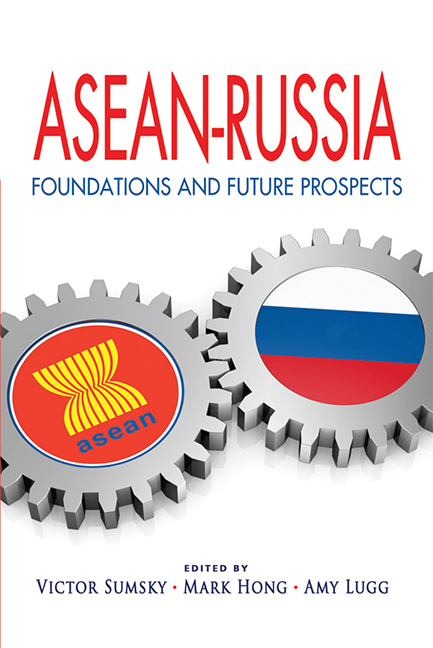Book contents
- Frontmatter
- Contents
- Foreword
- Preface
- About the Contributors
- Keynote Address
- Opening Remarks
- Keynote Address
- Introduction: Russia and the ASEAN Member States: Political and Economic Cooperation in Progress
- SECTION I WISEMEN'S VIEWS
- SECTION II GEOPOLITICS
- Russia in Southeast Asia: A New “Asian Moment”?
- ASEAN-Russia Military Ties: Reconfiguring Relations
- The Enlargement of the East Asia Summit: The Reasons and Implications of Bringing Russia In
- Russia's Entry into ASEM: Not Just a Courtesy Call?
- Russia-India-China: Acting in Concert in Southeast Asia?
- The South China Sea Issue: A View from Russia
- Southeast Asia and Russia: Forging a New Regional Architecture
- Russia-ASEAN Relations: An Indian Perspective
- SECTION III BILATERAL RELATIONS
- SECTION IV Business and Economics
- SECTION V CULTURE AND EDUCATION
- EPILOGUE
- Index
Russia in Southeast Asia: A New “Asian Moment”?
from SECTION II - GEOPOLITICS
Published online by Cambridge University Press: 21 October 2015
- Frontmatter
- Contents
- Foreword
- Preface
- About the Contributors
- Keynote Address
- Opening Remarks
- Keynote Address
- Introduction: Russia and the ASEAN Member States: Political and Economic Cooperation in Progress
- SECTION I WISEMEN'S VIEWS
- SECTION II GEOPOLITICS
- Russia in Southeast Asia: A New “Asian Moment”?
- ASEAN-Russia Military Ties: Reconfiguring Relations
- The Enlargement of the East Asia Summit: The Reasons and Implications of Bringing Russia In
- Russia's Entry into ASEM: Not Just a Courtesy Call?
- Russia-India-China: Acting in Concert in Southeast Asia?
- The South China Sea Issue: A View from Russia
- Southeast Asia and Russia: Forging a New Regional Architecture
- Russia-ASEAN Relations: An Indian Perspective
- SECTION III BILATERAL RELATIONS
- SECTION IV Business and Economics
- SECTION V CULTURE AND EDUCATION
- EPILOGUE
- Index
Summary
INTRODUCTION
Russia's role as a power in Asia has seen different iterations over time. Stretching geographically across the north of Eurasia, Russia has always been caught between the influences of East and West, with its own identity and relationships straddling both spheres. Its interactions with East and West show tremendous influence upon both European and Asian history. The Russian factor in European history brings to mind such moments as Peter the Great's victory over Sweden, Tsar Alexander I's defeat of Napoleon's army in 1812, the Soviet routing of Hitler's forces during World War II, the Cold War confrontation across Eastern and Western Europe, and NATO and EU expansion to include the former USSR's sphere of influence. Since the end of the Cold War, Russia has occupied a more diminished role overall in Europe, yet it is also undeniable that Russia remains a key player in arms control, energy security, and conflict management in the region.
On the Asian side of the equation, moments that stand out include the Mongol invasion of, and rule over, ancient Rus’; Russia's expansion across Siberia and Central Asia; the Russo-Japanese war of 1904–05; Russia's foray into China, Manchuria and Korea; the “Great Game” between Britain and Russia in Afghanistan; the Soviet invasion of Afghanistan; Soviet support for India and Vietnam during the Cold War; the Sino-Soviet conflict; and the Soviet Union's (and later, Russia's) relatively low profile and influence in the Southeast Asian region.
Historically, Russia has been a stronger player in Europe than in Asia, with Russian elites traditionally using Europe rather than Asia as a point of reference for Russia's evolution and role as a great power. In Asia, Russia has had many difficult moments, particularly in the twentieth century. However, after the end of the Cold War, a new chapter may have opened in Russia's interaction with Asia and its role in the region. At the moment, China and the United States remain the leading powers in Asia, but Russia's prominence and power in the region is growing and has more room to grow.
- Type
- Chapter
- Information
- ASEAN-RussiaFoundations and Future Prospects, pp. 45 - 57Publisher: ISEAS–Yusof Ishak InstitutePrint publication year: 2012

